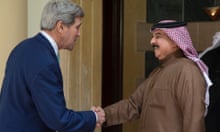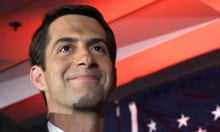The director of the CIA came the closest of any US official so far to acknowledging cooperation between the US and Iran in their current war against the Islamic State in Iraq.
Asked during a Council on Foreign Relations appearance on Friday afternoon if the US was formally coordinating its airstrikes in Iraq with Iranian forces and proxies on the ground, CIA director John Brennan did not bat away the notion, as Obama administration officials typically do.
Instead, Brennan suggested that such coordination is laundered through the Iraqi government, Washington and Tehran’s mutual partner – something widely suspected as the Iraqi military and Shia militias attempt to claw back the city of Tikrit from Isis.
“There’s an alignment of some interests between ourselves and Iran, clearly, in terms of what Isil [Isis] has done there,” Brennan told moderator Charlie Rose.
“We work closely with the Iraqi government. The Iranians work closely with the Iraqi government as well. And so, some of these efforts, I think, through the Iraqi interlocutors, are ones that, again, are trying to advance our common objectives against Isil.”
Senior US officials typically dismiss the subject outright. “We do not coordinate with the Iranians,” general Lloyd Austin, the commander of US forces in the Middle East, told a House of Representatives panel last week.
Brennan’s New York speech represented an attempt by the director to move past the twin scandals that have defined his two-year tenure at the head of the CIA: the agency’s torture record and its spying on its legislative overseers in Congress.
The embattled director did not touch on the torture scandal at all, preferring instead to focus on what he described as a years-long fight against Isis, the “complexities” of an unstable world and other friendlier terrain – but he did suggest the CIA persists in interrogating suspected terrorists.
It was Brennan’s first major public address since a combative December press conference following the Senate intelligence committee’s damning partial release of its torture inquiry. The landmark report revealed that the CIA tortured innocent men; sexually abused detainees using a technique called “rectal rehydration”; and led some to beg for death.
The report capped a year that stands among the CIA’s lowest. Brennan had to apologise for initially denying that the CIA spied on the committee staff members investigating the agency. A hand-selected CIA review panel revealed that Brennan was personally concerned that the Senate investigators had “secretly removed” files from a firewalled shared server, a driver of the spying that Democratic senator Dianne Feinstein called a constitutional crisis. (The panel said Brennan had a “misunderstanding” that his concern would lead to spying on the Senate investigators.)
Brennan is attempting to mend fences with the Senate panel, now run by Richard Burr, a North Carolina Republican and skeptic of the torture investigation. But on Thursday, Ron Wyden, the Oregon Democrat on the Senate intelligence committee, told Buzzfeed he did not “have confidence” in Brennan.
As part of his 2015 reemergence, Brennan announced last week that he was reorganising the CIA. No more will its analysts and clandestine officers perform their related functions independently: they will now work alongside each other in silos devoted to priority tasks, including counterterrorism and, for the first time, cybersecurity. The security journalist Jeremy Scahill tweeted that Brennan’s move would have the effect of weakening analytic independence.
Scahill, one of the founders of the Intercept, also last week revealed documents leaked by intelligence whistleblower Edward Snowden showing the CIA’s years-long effort to break encryption on Apple mobile devices like iPads and iPhones and a related effort by Britain’s GCHQ to surreptitiously retrieve communications data from them.
Brennan did not address the Apple allegations at all, nor did his questioners press him on any uncomfortable subject. Yet the CIA director suggested that the agency still participates in shadowy overseas interrogations – which he preferred to term “debriefs” – alongside the CIA’s constellation of foreign intelligence partners.
“There are places throughout the world where CIA has worked with other intelligence services and has been able to bring people into custody and engage in the debriefings of these individuals, either through our liaison partners or sometimes there are debriefings that take place as well,” Brennan said.
In Iraq, Brennan said the US “recognise[s] that Iran has legitimate interests there”, but stopped short of confirming formal cooperation.
“I am not engaging with Mr Qassem Suleimani, the head of the Qods Force,” Brennan said, referencing Iran’s major military and intelligence power broker in the region, who plays a high-profile role in Iraq’s fight against the Islamic State.








Comments (…)
Sign in or create your Guardian account to join the discussion